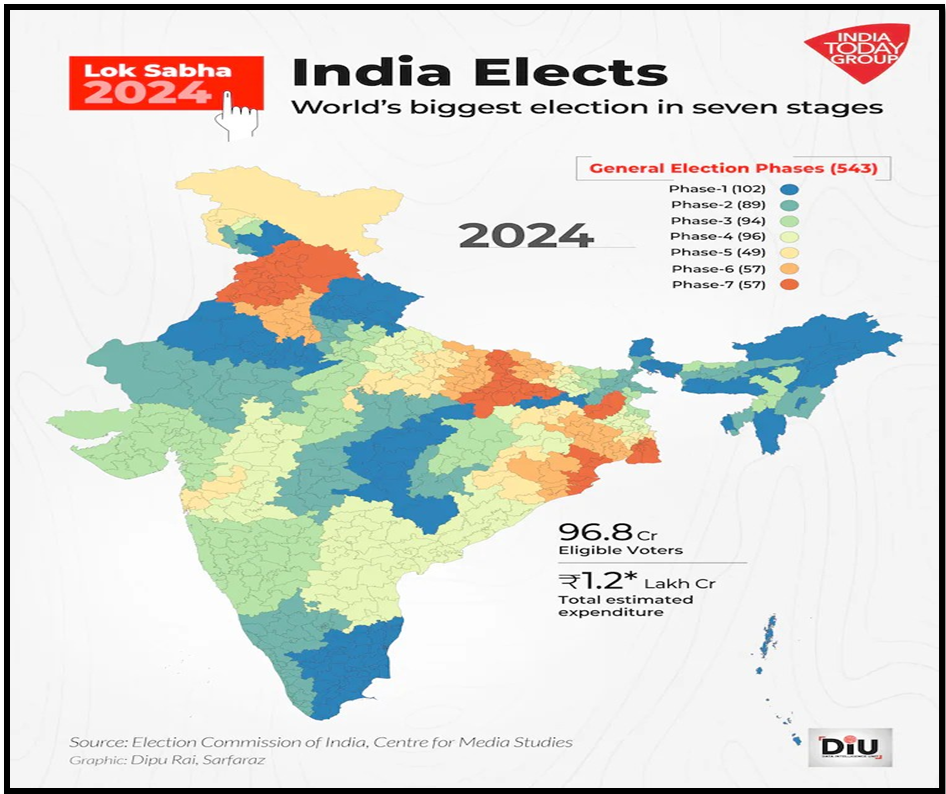ONE ELECTION, ONE PHASE
Syllabus:
GS 2:
- Elections in India and related reforms ,
- Election Commission of India
Focus:
The debate over transitioning India to single-phase elections has gained prominence due to concerns over logistical complexities, security risks, and the need for electoral efficiency amidst modern challenges like social media influence and voter accessibility.
Source: TH
The Logic of Multi-Phase Elections
- Questioned approach: The logic of multi-phase elections has increasingly come under scrutiny, particularly in the context of modern challenges like climate change and social media.
- Historical rationale: Initially, multi-phase elections were justified for the protection of lives — of voters and polling staff — amidst widespread violence and political pressures.
- Current challenges: Recent elections, such as the seven-phase election held in extreme temperatures, raised significant concerns about practicality and voter safety.
- Political and media critique: Almost all political parties and media outlets have criticized prolonged elections for their logistical challenges and voter fatigue.
- Commission’s acknowledgment: Even the Chief Election Commissioner acknowledged the need for shorter election durations to mitigate risks and enhance efficiency.
Evolution of Election Processes
- Historical context: During the introduction of multi-phase elections, violence and electoral malpractices were rampant, necessitating phased deployment of security forces.
- Peaceful elections: This measure initially ensured peaceful elections but faced criticisms in recent years due to the rapid spread of misinformation and hate speech via social media.
- Impact of social media: The explosion of social media has drastically altered electoral dynamics, facilitating the rapid dissemination of fake news and divisive rhetoric.
- Technological revolution: The proliferation of internet users and social media platforms has exponentially increased the reach and influence of electoral content.
- Lack of transparency: Studies have shown significant shortcomings in transparency and accountability regarding sponsored political content on social media platforms.
Ensuring Peaceful Elections
- Effective measures: The Election Commission has introduced vulnerability mapping and legal actions against troublemakers to ensure safe polling stations.
- Arms control: Campaigns to seize illegal arms and surrender licensed firearms have contributed to reducing electoral violence.
- Execution of warrants: Improved execution of non-bailable warrants against criminals has minimized their influence during elections.
- Legal provisions: Existing laws such as IPC Sections 295A, 153A, 499, 505, and 506 are invoked to control hate speech, cyber crimes, and electoral malpractices.
- Implementation emphasis: The prompt and thorough implementation of these laws is crucial to maintaining peace and integrity during elections.
Moving Towards Single-Phase Elections
- Logistical feasibility: A general election can be feasibly conducted in a single phase with the availability of sufficient paramilitary forces.
- Resource utilization: Consolidating elections into a single phase would optimize resource allocation and reduce campaign expenditures.
- Political efficiency: Shortening election durations would minimize disruptions to governance and normal public activities.
- Mitigating misinformation: A single-phase election would curtail the spread of misinformation and divisive campaigning over prolonged periods.
- Leadership concern: Addressing concerns expressed by leaders about the economic costs and operational disruptions caused by prolonged elections.
Understanding One Nation-One Election (ONOE):
Background:
Simultaneous Elections Elsewhere:
|
Challenges in Transitioning to Single-Phase Elections
- Logistical Complexity: Consolidating elections into a single phase poses significant logistical challenges, including the deployment and management of large-scale paramilitary forces across diverse geographical regions.
- Voter Accessibility: Ensuring equitable access to polling stations and voting facilities for all eligible voters, particularly in remote and conflict-prone areas, remains a critical challenge.
- Security Concerns: Concentrating elections in a single phase increases security risks, necessitating robust measures to prevent violence, intimidation, and electoral malpractices.
- Political Consensus: Achieving consensus among political parties and stakeholders on transitioning to single-phase elections may be challenging, given varying interests and concerns.
- Technological Integration: Leveraging technology effectively to manage voter registration, polling booth logistics, and real-time monitoring across a vast country like India requires substantial infrastructural upgrades.
- Media and Communication: Managing media coverage and communication strategies to ensure balanced reporting and prevent the spread of misinformation during intensified electoral periods is crucial.
- Public Awareness: Educating voters about the revised election schedule and ensuring their participation in a single-phase format requires robust civic engagement and outreach efforts.
- Legal and Institutional Readiness: Strengthening legal frameworks and institutional capacities to handle increased workload and scrutiny during a compressed election timeline is essential.
Way Forward for Implementing Single-Phase Elections
- Pilot Projects: Conduct pilot projects in select states to test the feasibility and iron out operational challenges of single-phase elections.
- Stakeholder Consultation: Engage political parties, civil society organizations, and electoral experts in discussions to build consensus and address concerns.
- Technology Adoption: Invest in advanced electoral technology for voter registration, polling station management, and result dissemination to enhance efficiency and transparency.
- Strategic Deployment: Develop strategic deployment plans for paramilitary forces and security personnel to ensure comprehensive coverage and rapid response capabilities.
- Legal Reforms: Introduce legislative reforms to streamline electoral laws, enhance enforcement of election-related offenses, and strengthen accountability mechanisms.
- Public Awareness Campaigns: Launch extensive voter education campaigns to inform citizens about the benefits and process of single-phase elections.
- Monitoring and Evaluation: Establish robust monitoring and evaluation mechanisms to assess the effectiveness of single-phase elections and address emerging challenges.
- International Best Practices: Draw lessons from countries successfully conducting single-phase elections and adapt relevant best practices to the Indian context.
Conclusion
In conclusion, while the transition to single-phase elections presents formidable challenges, including logistical, security, and political considerations, it offers substantial benefits in terms of operational efficiency, cost-effectiveness, and enhancing democratic integrity. Strategic planning, stakeholder consensus, and technological innovation are crucial for successful implementation.
Source:The Hindu
Mains Practice Question:
Discuss the challenges and potential benefits of transitioning India from multi-phase to single-phase elections. How can these challenges be addressed, and what strategies should be adopted to ensure a smooth transition while maintaining electoral integrity?
Associated Article:
https://universalinstitutions.com/navigating-the-path-of-one-nation-one-election/
Youtube:




